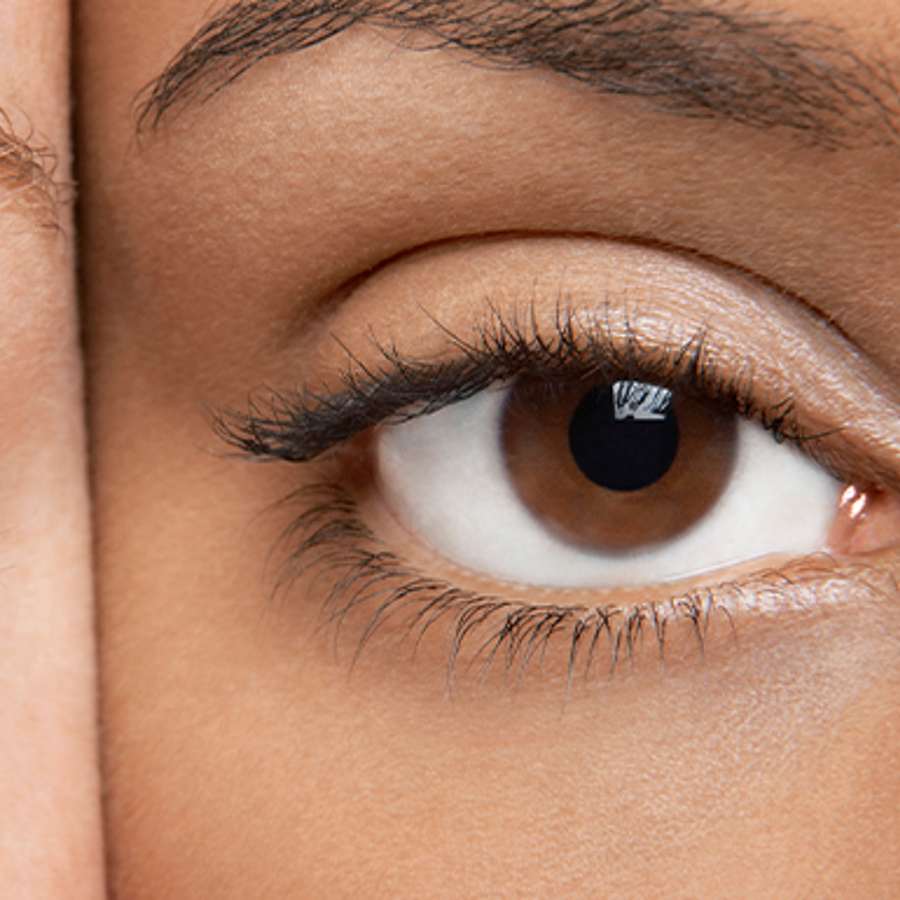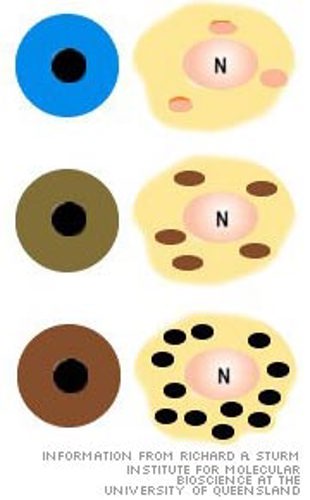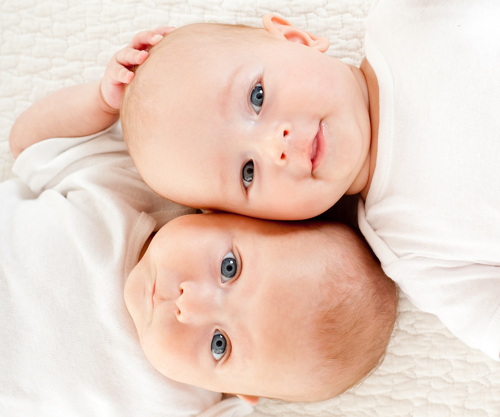
Why did the very blue eyes of a kid become brown when he grew up?
June 2, 2006

- Related Topics:
- Eye color,
- Complex traits,
- Pigmentation traits
A curious adult from Brazil asks:
"Why did the very blue eyes of a kid become brown when he grew up?"
People tend to think of traits like eye color as rock steady. But they're not.
Many babies born with blue eyes end up with green or brown eyes. Children's hair will often darken with age. And eye color can and does change for some adults.
So what is going on here? How can you get the genes for brown eyes but not have the brown appear until later in life? It has to do with how genes work.
Pigment Production
The genes for eye color determine how much pigment is in a part of the eye called the stroma of the iris. As you can see from the picture below, the more pigment you have the darker your eye color.

People with very little pigment have blue eyes, some pigment gives green eyes and lots of pigment gives brown eyes. The same phenomenon that makes the sky blue is also what makes people with little or no pigment in their stroma have blue eyes.
Let's say you have the gene(s) that lead to lots of pigment in the stroma of the iris. Why would you be born with blue eyes?
Remember genes are like recipes for making proteins. Think about a recipe for making spaghetti. If no one reads the recipe, gets the ingredients and follows the directions, what do you have? A piece of paper.
Same thing with a gene. If the cell doesn't read the gene then you don't get a protein (no "spaghetti"). An unread gene is just a piece of DNA -- an unused recipe. And for eye color, an unread recipe means blue eyes.
At birth, the genes that make the pigment protein are not being read by the cell (they are turned off). This means that a lot of babies start off with blue eyes.
Light then triggers the eye cells to start reading the eye color genes. But it can take a while for the cell to ramp up to the final levels of pigment. That is why so many babies have blue eyes for their first months of life. Usually by their first birthday, a baby's eye color has settled in (although it can sometimes take three years or even longer).
All or nothing?
But what about changes later in life such as in the case of the boy that you ask about? The boy you mentioned may have had an eye color change later in life because for some reason the start up of the eye color gene was delayed. Or maybe the gene became more active and started to make more pigment protein later in life.
It is important to remember that genes are not just on or off. Basically, genes can become more or less active.

You can think of genes like your own exercise habits. Ideally, you would faithfully exercise everyday but in reality you miss a day here or there or sometimes quit or maybe workout really hard for a few weeks and then stop. Well, genes have the same "motivational" issues.
You have a number of genes that together are involved in making your protein pigments and these genes can change in their activity. In most cases the genes that make our pigment protein are pretty disciplined. This means they make close to a constant amount of protein so that our eye color stays pretty much the same after infancy.
But sometimes these genes get lazy or more motivated. What could have made this kid's eye color genes more active? It is hard to know.
Perhaps it had something to do with puberty. At puberty, all those new hormones change how lots of genes work. Maybe for this boy, his eye color gene was affected by these hormones.
Or maybe a virus turned up the gene. Some viral DNA can settle into our DNA. If the virus inserts itself near one of our genes, it can sometimes turn that gene up (or down). And there are lots of other possibilities too.
Some diseases can also change eye color. For example, there are a few diseases that are known to result in a progressive loss of iris color (Horner's syndrome and Fuchs' heterochromic iridocyclitis are two examples).
And that's just half the story. So far we've only talked about making more pigment as a way for eye color to darken. Another possibility is that the pigment that gets made is more stable.
Persistent Pigments
The amount of pigment in our eyes is really a balance between the amount being made and the amount being destroyed. How would the pigment protein suddenly become more stable?
Some genes make proteins that destroy other proteins. If a pigment-destroying gene makes less protein, then someone's eye color might darken. And vice versa.
OK, so there are lots of ways that eye color can change later in life. Is there any evidence that the change can be genetic? Yes.
Scientists found this out by looking at identical and fraternal twins. Remember, identical twins have the same DNA (and therefore the same genes). Fraternal twins are no more alike than any brother or sister.
So if the eye color of both twins in an identical twin pair change color at the same rate, then genetics may be involved. The clincher is if the eye color of twins in a fraternal pair changes at a different rate. This would argue that genes are very important in this process.
And this is what researchers saw. Researchers observed the eyes of identical and fraternal twins of American Caucasians older than 6 years.

Both sets of twins showed a darkening of their eye color with age. The identical twins changed color together, at essentially the same rate. The fraternal twins changed color but at different rates, which indicates a "strong genetic influence in the timing of these color changes."1
As you can see, there are lots of ways to change how a gene works over time. In fact, this is one of the reasons identical twins become more different over time. They have the same DNA but their genes are turned up or down to different levels.
All in all, our genes are pretty dynamic and unpredictable - but hey that's what makes being a geneticist fun right?

 Skip Navigation
Skip Navigation
